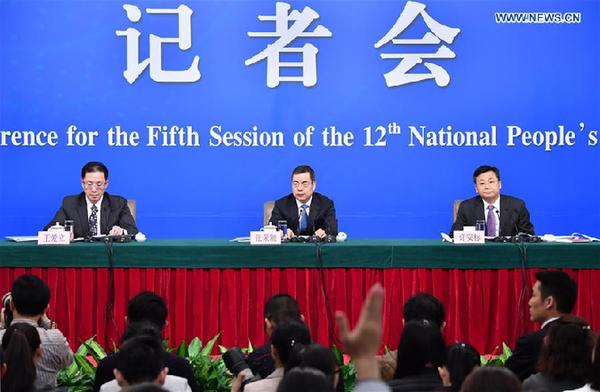China's quest for a modern 'Civil Law Code'
- By Eugene Clark and Wu Xianshu
 0 Comment(s)
0 Comment(s) Print
Print E-mail China.org.cn, March 13, 2017
E-mail China.org.cn, March 13, 2017
|
|
|
Zhang Rongshun and Xu Anbiao, vice-chairmen of the Legislative Affairs Commission of the National People's Congress (NPC) Standing Committee, and Wang Aili, director-general of the Office of Criminal Laws of the Legislative Affairs Commission of NPC Standing Committee, take questions on the draft general provisions of civil law and legislation of the NPC at a press conference for the fifth session of the 12th NPC in Beijing, capital of China, March 9, 2017. (Xinhua/Li Xin) |
China is serious about establishing a country governed by rule of law. China's legal system has been and continues to be influenced by the historical, cultural, social, geo-political and economic realities that have impacted China over the many centuries of its development. It must also be remembered that China has undergone more changes than almost any other country. The new Civil Code, which China's formulating to provide the legal framework for rule of law, represents a new stage of maturity in which social and economic rights and obligations come together.
All of this means that the construction of a rule of law system remains a major task for China's legislative body. This process involves constant adaptation and it is a difficult, evolutionary and often contentious process.
During the on-going "two sessions" (the annual meetings of the National People's Congress and the Chinese People's Political Consultative Conference), the codification of civil law was again the subject of much discussion and debate with the draft of the "General Principles of Civil Law" - the first part of the Civil Code - having been submitted for further review to the 5th session of the 12th National People's Congress. This brief article focuses only on a few key points in what is a work-in-progress of the draft for "General Principles of Civil Law."
The first key point involves the foundations of China's civil law system. As the first part of the Civil Code, the draft "General Principles of Civil Law" stipulates key provisions, including the concepts of natural person and legal person, the capacities of civil rights and civil conduct, the doctrine of civil juristic acts, civil rights, legal agencies and civil liabilities and articles related to the limitation of legal actions. There are many issues in these areas that must be resolved if China is to benefit from a modern legal system that will carry it forward to the next stages of development. For example, many uncertainties remain regarding property rights and how the legal system should deal with social issues such as isolated elderly people and children.
Also in need of clarification in the new Code is what Chinese law refers to as "personality rights," which refer to basic fundamental human rights that should be given to all Chinese citizens. These include: health care, protection of reputation, image, name and freedom.
Another significant improvement to be found in the draft is the adoption of new rules in response to the increasing needs of the public. For example, the draft improves the protection of embryos' rights by stipulating that within the scope of inheritance or other conditions where the rights of embryos might be infringed upon, embryos should be considered as having the standing and capacity to conduct civil activities.
Given the importance and strong public interest in the issues raised by the Civil Law, there are many issues yet to be resolved and legislators are continuing their research.
Along with the development of China's economy and greater social awareness of its citizens, the Chinese government and citizenry are expecting the finalization of China's Civil Code in the near future. Upon completion, this legal system will provide the necessary infrastructure for protecting both the legitimate rights of citizens while at the same time meeting the needs of China's future social and economic development.
Wu Xianshu is a legal consultant of Simpson Thacher Bartlett LLP who has a LLB degree from China University of Political Science and Law
Eugene Clark is a columnist with China.org.cn. For more information please visit:
http://m.91dzs.com/opinion/eugeneclark.htm
Opinion articles reflect the views of their authors only, not necessarily those of China.org.cn.






